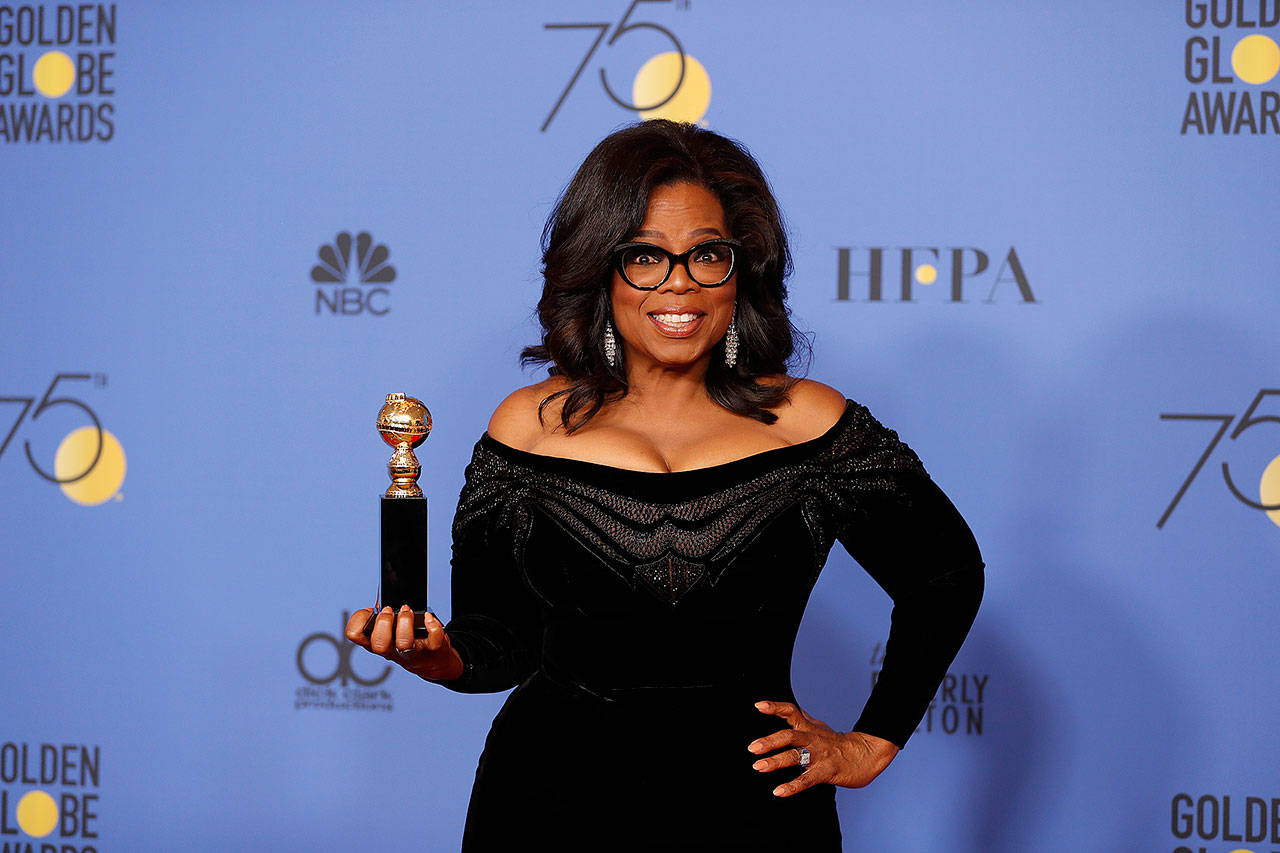By Michael Finnegan
Los Angeles Times
It sounds so simple: If Donald Trump can win the presidency, why couldn’t Oprah Winfrey?
A day after her rousing speech at Sunday’s Golden Globes, speculation about Winfrey’s potential White House aspirations sparked some instant handicapping among Washington insiders.
Winfrey, 63, is younger than some of the top Democrats who might run, William Kristol, editor of the conservative Weekly Standard magazine, told followers on Twitter. He also suggested she might stand a better shot in the primaries.
“Sounder on economics than Bernie Sanders, understands Middle America better than Elizabeth Warren, less touchy-feely than Joe Biden, more pleasant than Andrew Cuomo, more charismatic than John Hickenlooper,” he wrote.
Ezra Klein, editor at large of the Vox online news site, said Americans were already “tired of having a celebrity with no political experience fumbling around as president.”
“Not sure Oprah (or Tom Hanks, or Mark Cuban, etc) will be a compelling answer to that,” he tweeted.
Winfrey meets all three constitutional tests to run for president: She’s over 35, she’s a U.S. citizen, born in the United States, and she has lived here for more than 14 years.
Her wealth and fame would be enormous assets, just as they were for Trump. Her net worth is $2.8 billion, according to Forbes.
But much of the Oprah 2020 chatter ignores the hard realities of running for president, even for one of the nation’s best known and most popular celebrities.
To millions of Americans, she might seem familiar after decades of hosting a TV talk show, acting in Hollywood movies and now reporting as a special correspondent on CBS’ “60 Minutes.”
But presidential candidates face a vetting far more invasive than anything Winfrey has ever endured.
Beyond the news media’s scrutiny of her personal and professional life, opponents — including a large field of Democrats — would compile dossiers on her past, timing the release of embarrassing details to inflict maximum damage.
“My experience with celebrities is they’re enamored with the talk and with the thought of being president or governor or what have you, but when they step up to the line and they understand the scrutiny they have to go through … they back away,” said John Weaver, a top strategist in the presidential campaigns of Republicans Sen. John McCain and Ohio Gov. John Kasich.
Weaver also questioned whether voters would see a “campaign run out of Bel-Air” as a suitable antidote to Trump’s disruptive presidency.
Winfrey, who supported Barack Obama and Hillary Clinton for president, has shot down past speculation that she might run.
“There will be no running for office of any kind for me,” she told her best friend Gayle King in October on “CBS This Morning.”
But after Winfrey’s Golden Globes speech Sunday on the national upheaval over sexual harassment, her longtime partner, Stedman Graham, told the Los Angeles Times: “It’s up to the people. She would absolutely do it.”
It would not be easy. Thousands of hours of video, some never seen by the public, would instantly become fodder for attacks.
In the context of a campaign, little-noticed banter from long ago can turn toxic.
Trump once told radio shock-jock Howard Stern that he enjoyed seeing naked women backstage at his beauty pageants.
He also told Stern that he backed President George W. Bush’s invasion of Iraq, a statement he later denied making despite the audio evidence.
And Trump’s campaign nearly collapsed when a recording surfaced of him telling “Access Hollywood” anchor Billy Bush that he got away with sexually assaulting women because he was famous.
It’s easy to forget that while Trump won the Electoral College by carrying a few key states by extremely narrow margins, he finished almost 2.9 million votes behind Clinton.
The attacks on Winfrey were swift. Some conservatives mocked her online, posting some of the many photos of Winfrey with former movie producer Harvey Weinstein, who was disgraced by the multiple allegations of sexual abuse against women that helped set off the #MeToo movement.


